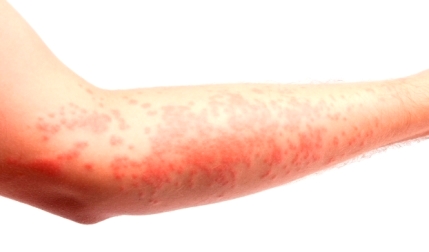
It’s important to understand the cause of hives because the treatment may vary depending on the cause. Hives can be caused by many different things and sometimes it’s hard to figure out what’s causing them.
Common Causes of Hives
Common causes of hives include:
- Allergic reactions to foods. Common foods that trigger reactions include shellfish, peanuts, other nuts, milk or other dairy products, eggs, foods containing gluten, soy products, and citrus fruits.
- Allergic reactions to medications. All medications can cause allergic reactions, but allergic reactions often occur in response to certain antibiotics (especially penicillin), blood pressure medications, and ibuprofen (found in pain relievers like Advil, Aleve, and Motrin).
- Allergic reactions to things in the environment, like pollen, mold, or pet dander.
- An allergic reaction to latex.
- Allergic reactions to household chemicals, like cleaning products, laundry detergents, deodorants, or soaps.
- Exposure to chemicals.
- Insect stings.
- Infections.
- Some viruses.
- Some types of cancer.
- Lupus.
- Thyroid disorders.
- Immune system disorders.
- Vascular disorders (disorders of the blood vessels).
- Too much exposure to sun, heat, or cold temperatures.
- Exercise. This can cause hives due to excessive sweating.
- Too much pressure on the skin, such as from sitting in one position for too long.
- Emotional stress.
- Menopause.
- Pregnancy.
As you can see, there are numerous things that can cause hives. Identifying the cause of hives is important because different causes require different treatments. You deal with food allergies very differently than you deal with stress, for instance. You treat an infection very differently than a thyroid disorder. If you have hives and aren’t sure what’s causing them, see your doctor for a diagnosis. If you develop hives and also have trouble breathing or swallowing, go to the nearest emergency room or call 911 right away.

Treating The Cause of Hives
The treatment for hives involves treating the condition causing the hives, if possible. That may mean medication, such as antibiotics for hives caused by infections or prescription drugs to treat serious conditions like lupus or thyroid disorders. In many cases, though, it means avoiding or at least reducing exposure to the thing that triggered your hives. If you have food allergies, you’ll need to avoid the foods that trigger reactions. If you have hives caused by stress, it probably won’t be possible to eliminate all sources of stress from your life, but you’ll need to reduce stress as much as possible and learn ways to manage stress better in order to stop breaking out in hives.
Treating The Symptoms
Whatever the cause of hives, you’ll want to eliminate the itching and discomfort that comes with the condition. According to the Mayo Clinic, doctors often recommend medications like antihistamines and/or corticosteroids to relieve symptoms like itching, redness, and swelling. These are usually effective but can cause side effects. For instance, antihistamines often cause drowsiness and corticosteroids carry a long list of potential side effects, some of them quite serious. Some people prefer to use natural treatments for hives instead.
Whatever treatment you choose, remember that relieving the symptoms is only one part of a complete treatment for hives. You still need to address the cause of your hives. Otherwise, symptoms will probably just return.
A Natural Treatment For Hives
Our favorite natural treatment for hives is OxyHives. It’s an all-natural, homeopathic remedy that quickly relieves the symptoms of hives. It works by stimulating the body’s immune system to heal itself. If you have hives and also have trouble breathing or swallowing, you need immediate medical help. Go to the nearest emergency room or call 911. Otherwise, you might prefer to try OxyHives before heading for the medicine cabinet. To learn more about our preferred treatment for hives, just follow the link.
Additional Reading:
Hives Caused by Nerves – Information on the link between hives and stress. Tips and advice for coping with hives that are caused by nerves.
Pictures of Hives – See how hives look on different parts of the body.
Home Remedies For Hives – What works best. Comparison of home remedies, natural treatments and OTC medicines.
Urticaria Hives Treatment – Comparison of treatment options.
Are Hives Contagious? – They are not contagious, but the condition causing the hives may be. Follow the link to learn more.
How Long Hives Last – Acute hives usually last no longer than 6 weeks, while chronic hives last longer than 6 weeks, sometimes much longer.
Mayo Clinic: Treatment & Drugs
